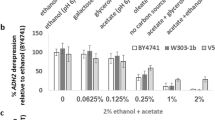Abstract
Most organisms prefer to utilize glucose as a carbon source. Accordingly, the expression of genes involved in the catabolism of other carbon sources is repressed by the presence of glucose in a process known as (carbon) catabolite repression. However, much less is known about the relationships between “poor” carbon sources. We have recently shown that the enzyme alcohol dehydrogenase of the yeast Saccharomyces cerevisiae (ADH2), required for the utilization of ethanol, is not only inhibited by glucose, but by the acetate imported from the medium or produced by ethanol metabolism. Our study showed that sensing of acetate takes place within the cell, and not in the external medium, and that “poor” carbon sources are also utilized according to a pre-established hierarchy.

Similar content being viewed by others
References
Casal M, Paiva S, Queiros O, Soares-Silva I (2008) Transport of carboxylic acids in yeasts. FEMS Microbiol Rev 32:974–994. https://doi.org/10.1111/j.1574-6976.2008.00128.x
Eskes E, Deprez MA, Wilms T, Winderickx J (2018) pH homeostasis in yeast; the phosphate perspective. Curr Genet 64:155–161. https://doi.org/10.1007/s00294-017-0743-2
Gancedo JM (1998) Yeast carbon catabolite repression. Microbiol Mol Biol Rev 62:334–361
Giannattasio S, Guaragnella N, Zdralevic M, Marra E (2013) Molecular mechanisms of Saccharomyces cerevisiae stress adaptation and programmed cell death in response to acetic acid. Front Microbiol 4:33. https://doi.org/10.3389/fmicb.2013.00033
Kim JH, Roy A, Jouandot D 2nd, Cho KH (2013) The glucose signaling network in yeast. Biochem Biophys Acta 1830:5204–5210. https://doi.org/10.1016/j.bbagen.2013.07.025
Kim MS, Cho KH, Park KH, Jang J, Hahn JS (2018) Activation of Haa1 and War1 transcription factors by differential binding of weak acid anions in Saccharomyces cerevisiae. Nucl Acids Res. https://doi.org/10.1093/nar/gky1188
Leshets M, Ramamurthy D, Lisby M, Lehming N, Pines O (2018) Fumarase is involved in DNA double-strand break resection through a functional interaction with Sae2. Curr Genet 64:697–712. https://doi.org/10.1007/s00294-017-0786-4
Li L, Ward DM (2018) Iron toxicity in yeast: transcriptional regulation of the vacuolar iron importer Ccc1. Curr Genet 64:413–416. https://doi.org/10.1007/s00294-017-0767-7
Okazaki S, Naganuma A, Kuge S (2005) Peroxiredoxin-mediated redox regulation of the nuclear localization of Yap1, a transcription factor in budding yeast. Antioxid Redox Signal 7:327–334. https://doi.org/10.1089/ars.2005.7.327
Paiva S, Vieira N, Nondier I, Haguenauer-Tsapis R, Casal M, Urban-Grimal D (2009) Glucose-induced ubiquitylation and endocytosis of the yeast Jen1 transporter: role of lysine 63-linked ubiquitin chains. J Biol Chem 284:19228–19236. https://doi.org/10.1074/jbc.M109.008318
Pascual-Ahuir A, Manzanares-Estreder S, Timon-Gomez A, Proft M (2018) Ask yeast how to burn your fats: lessons learned from the metabolic adaptation to salt stress. Curr Genet 64:63–69. https://doi.org/10.1007/s00294-017-0724-5
Ratnakumar S, Kacherovsky N, Arms E, Young ET (2009) Snf1 controls the activity of adr1 through dephosphorylation of Ser230. Genetics 182:735–745. https://doi.org/10.1534/genetics.109.103432
Sanz P, Viana R, Garcia-Gimeno MA (2016) AMPK in yeast: the SNF1 (sucrose non-fermenting 1) protein kinase complex. Exs 107:353–374. https://doi.org/10.1007/978-3-319-43589-3_14
Simpson-Lavy K, Kupiec M (2018) A reversible liquid drop aggregation controls glucose response in yeast. Curr Genet 64:785–788. https://doi.org/10.1007/s00294-018-0805-0
Simpson-Lavy K, Kupiec M (2019) Carbon catabolite repression in yeast is not limited to glucose. Sci Rep 9:6491. https://doi.org/10.1038/s41598-019-43032-w
Soontorngun N (2017) Reprogramming of nonfermentative metabolism by stress-responsive transcription factors in the yeast Saccharomyces cerevisiae. Curr Genet 63:1–7. https://doi.org/10.1007/s00294-016-0609-z
Styger G, Prior B, Bauer FF (2011) Wine flavor and aroma. J Ind Microbiol Biotechnol 38:1145–1159. https://doi.org/10.1007/s10295-011-1018-4
Tani M, Funato K (2018) Protection mechanisms against aberrant metabolism of sphingolipids in budding yeast. Curr Genet 64:1021–1028. https://doi.org/10.1007/s00294-018-0826-8
Zhang N, Cao L (2017) Starvation signals in yeast are integrated to coordinate metabolic reprogramming and stress response to ensure longevity. Curr Genet 63:839–843. https://doi.org/10.1007/s00294-017-0697-4
Acknowledgements
This work was supported by funds from the Israel Science Foundation, the Israel cancer Research Fund and the Minerva Center to MK. We thank all members of the Kupiec group for ideas, encouragement and help.
Author information
Authors and Affiliations
Corresponding author
Additional information
Communicated by M. Kupiec.
Publisher's Note
Springer Nature remains neutral with regard to jurisdictional claims in published maps and institutional affiliations.
Rights and permissions
About this article
Cite this article
Simpson-Lavy, K., Kupiec, M. Carbon catabolite repression: not only for glucose. Curr Genet 65, 1321–1323 (2019). https://doi.org/10.1007/s00294-019-00996-6
Received:
Revised:
Accepted:
Published:
Issue Date:
DOI: https://doi.org/10.1007/s00294-019-00996-6




